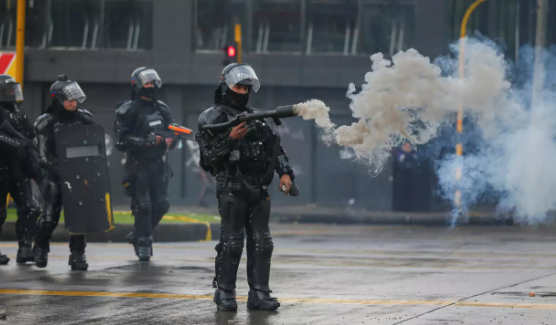Article by PBI-Canada

The BBC has reported: “[On September 22], in an unprecedented ruling, the Supreme Court of Justice ordered the national government to take administrative measures that guarantee peaceful protest, because the control forces are making a ‘systematic, violent and arbitrary intervention’ in against protesters.”
“The ruling also orders the Minister of Defense, Carlos Holmes Trujillo, to apologize for all the excesses of the State forces and to prohibit the use of 12-gauge shotguns by the Mobile Police Anti-Riot Squads (ESMAD), among other measures.”
In Colombia, the National Police are part of the Defense Ministry.
The Committee in Solidarity with Political Prisoners (CSPP), which is accompanied by the Peace Brigades International-Colombia Project, tweeted: “This [historic ruling] is thanks to the efforts of the victims of police violence, human rights organizations, professors and students from the Universidad de los Andes and Rosario.”
The Nation then reported: “President Duque’s government is appealing the decision.”
But on October 7, CSPP president Franklin Castañeda tweeted: “Minister @CarlosHolmesTru thought that he would deceive Justice, but the Superior Court of Bogotá has just let him know that his request for excuses did not comply with the order issued by the @CorteSupremaJ and therefore orders him to comply with the court order within one day.”
And Colombia Reports updates us: “Colombia’s defense minister on Wednesday [October 7] apologized for the violent crackdown of peaceful protests in November last year after a Bogota court gave him 24 hours to comply with a Supreme Court order.”
This is also happening in the context of the death of Javier Ordóñez on September 9. He had been stopped by the police, pinned down on the street, repeatedly shocked with a Taser, and then beaten at a police station before he died in police custody.
The Washington Post notes: “Thousands of protesters took to the streets of Bogotá in the aftermath of Ordóñez’s death last month, leading to clashes with security forces that left 13 people dead and more than 400 injured.”
“But instead of fizzling out, as protests here have tended to do, the incident has fueled a continuing string of demonstrations and social media agitation. Union members, student groups and human rights activists are now putting police brutality at the top of their list of grievances ahead of a national strike called for Oct. 21.”
That Washington Post article also quotes Castañeda of the CSPP who said: “We have noticed there is more citizen participation and more people becoming fed up over what they’re seeing in respect to the police.”
Temblores has reported almost 40,000 cases of police violence from 2017 to 2019, including 289 homicides. Last year, it reported that the ESMAD had killed 34 people since its inception in 1999. Most of those killed were activists within Indigenous, student, or peasant movements and none have resulted in a conviction.
A Peace Brigades International webinar on October 30 will be discussing the issue of police violence in Colombia, Kenya, Nicaragua, Guatemala and Canada. For more information on that and the details on how to register, please click here.

